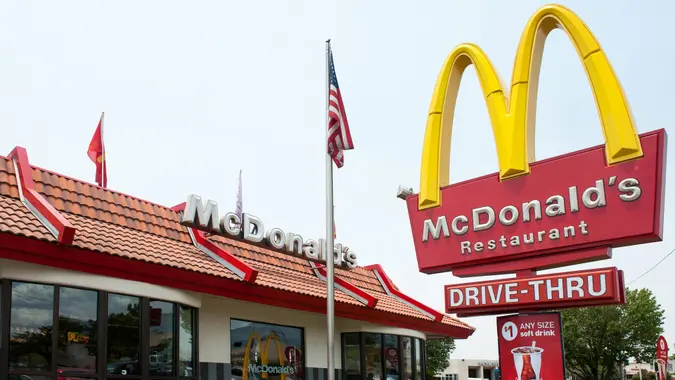The McDonald’s Boycott Every Investor Needs to Know About

Commitment to Our Readers
GOBankingRates' editorial team is committed to bringing you unbiased reviews and information. We use data-driven methodologies to evaluate financial products and services - our reviews and ratings are not influenced by advertisers. You can read more about our editorial guidelines and our products and services review methodology.

20 Years
Helping You Live Richer

Reviewed
by Experts

Trusted by
Millions of Readers
President Donald Trump rode various waves of sentiment to return him to the Oval Office. One of the key areas of contention that got him re-elected was his attack on diversity, equity and inclusion (DEI) initiatives. Soon after his return, Trump swiftly acted to undo many DEI programs in federal agencies. Many companies followed suit, rolling back or eliminating their respective programs.
Consumer sentiment has been balanced, but those upset by actions taken by corporate America have made themselves heard by imposing economic blackouts on firms.
McDonald’s is the latest company drawing the ire of upset Americans and their stock prices are reflecting that. Here’s what investors should know.
Why Are People Boycotting McDonald’s?
McDonald’s was one of the first companies to roll back its DEI initiatives.
“We are retiring setting aspirational representation goals and instead keeping our focus on continuing to embed inclusion practices that grow our business into our everyday process and operations,” said McDonald’s in a letter to its restaurant owners and operators in early January. The company announced numerous other changes to its DEI programs in the letter.
Those moves didn’t go unnoticed by The People’s Union, a grassroots group that supports DEI and corporate responsibility. The group called for a boycott of McDonald’s from June 24 to 30.
Besides pausing DEI initiatives, the boycott of McDonald’s was due to its perceived price gouging, use of tax loopholes, exploitation of workers, corporate greed and political corruption, according to a recent Instagram post.
Why the McDonald’s Boycott Comes at a Bad Time For the Restaurant Chain
It’s arguable whether or not economic blackouts work. However, the boycott of McDonald’s couldn’t come at a worse time for the company.
The fast food chain saw U.S. sales decrease by 3.6% in the first quarter of 2025, making it the worst quarter since the second quarter of 2020. McDonald’s serves 26 million customers in the United States daily. That’s enough volume to withstand some slumps but given that it has seen same-store sales fall for two consecutive quarters, following it up with another quarter of losses won’t look good.
Do Economic Blackouts Work?
McDonald’s isn’t the only corporation to face economic blackouts. Firms that have faced similar backlashes include Amazon, Target and Walmart. Some faced a one-day boycott on February 28, whereas others faced extended boycotts.
Amazon, for one, actually saw an increase in sales on its one-day boycott, according to Newsweek. Similarly, Costco experienced an impressive 22% increase in web traffic on February 28, thanks to its commitment to keeping DEI initiatives.
Walmart saw a slight decrease, but Target fared significantly worse. The company faced a 40-day boycott due to rolling back DEI initiatives, and the retailer conceded sales were impacted by the action, according to CNN. Net sales decreased by 2.8% in the first quarter of 2025 versus the same period in 2024. It’s debatable whether boycotts work, but the repercussions can vary widely.
It won’t be clear how McDonald’s boycott led by The People’s Union will impact sales until it reports its next earnings. Given how the restaurant has fared in recent quarters, investors may need to brace for further lagging sales.
 Written by
Written by  Edited by
Edited by 























